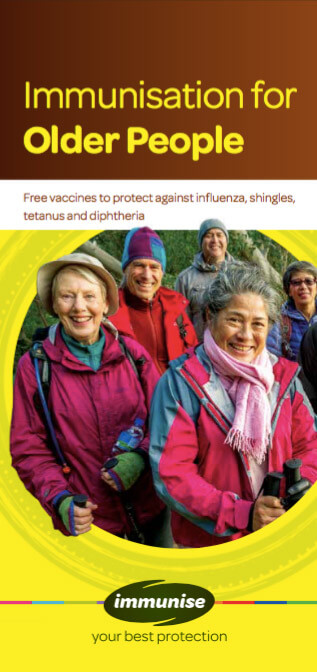You can now add Healthify as a preferred source on Google. Click here to see us when you search Google.
Common questions about vaccines and vaccination
Immunisation is also known as vaccination
Key points about vaccinations
- Vaccinations are one of the best ways to protect yourself and your whānau against many serious diseases.
- Here you will find commonly asked questions about vaccines and answers based on facts that can help clear up confusion caused by inaccurate information.
- You can then make a more informed choice for yourself and your whānau.

There’s a lot of information, both true and untrue, that we hear about vaccines and immunisation. Inaccurate information can cause confusion and it’s best to check where the information came from. Some questions you can ask are:
- Is it based on sound evidence from a reliable source?
- Is it up to date information including the latest research?
- Does it relate to Aotearoa New Zealand?
It’s normal to have questions about vaccines and it's best to discuss them with your healthcare provider.
The answers are based on facts so you can use the information to make a more informed choice for yourself and your whānau.
Video: Immunising your tamariki – your questions answered
(Health New Zealand | Te Whatu Ora, NZ, 2023)
Video: Immunisation – barriers
(Health New Zealand | Te Whatu Ora, NZ, 2025)
Safety and risks
Fact: Vaccines are very safe. Watch the video below to learn more about how vaccines are approved for use so we can trust they're safe to use.
Video: Vaccine safety
In the video below Dr Keriana Bird, a GP, helps answer the question of whether vaccines are safe.
(Ministry of Health, NZ, 2017)
Side effects
Most reactions from vaccines are an expected sign that your immune response is building. Most reactions are temporary and minor, eg, a mild fever or sore arm. These reactions show that the vaccine is working because your immune system is responding.
Vaccines prevent you from serious illness from disease. For some people, especially children, these illnesses can be fatal. This is far worse than a reaction you may have after a vaccine. So the benefits of being immunised against a disease by a vaccine greatly outweigh the risks, and without vaccines many more disabilities and deaths would occur.
It's rare to have a serious reaction following a vaccination. Anaphylaxis is a serious allergic reaction to a vaccine or 1 of it’s ingredients and happens soon after the injection has been given. This is the reason why you must wait at the doctor's clinic for 20 minutes after vaccination. Read more about medicines and side effects and reporting a reaction that you think might be a side effect.
Video: Louis's 15 month immunisations
(Health New Zealand | Te Whatu Ora, NZ, 2023)
Video: Are there any side effects from vaccines?
In the video below Dr Keriana Bird, a GP, helps answer the question about side effects of vaccines.
(Ministry of Health, NZ, 2019)
Fact: It’s impossible to get the disease from any vaccine that's made with dead (killed) bacteria or viruses or made from just part of the bacteria or virus.
The few vaccines in Aotearoa New Zealand that contain live organisms may cause some people to develop a very mild form of the disease with a rash and a fever. The risk of disease from vaccination is very small and much less severe than if you became infected with the disease-causing organism itself.
Vaccines only contain killed bacteria or viruses or a part of the bacteria or virus, or a much weaker form that is just enough to stimulate your immune system without causing the disease or putting you at risk of complications from the disease.
Fact: Vaccines don't contain harmful amounts of ingredients. Vaccines contain ingredients that allow them to be safely given to you. The ingredients in vaccines are at a lower level than what we are naturally exposed to in our environment. This means they don't cause harm as part of a vaccine.
Video: What ingredients are in a vaccine?
In the video below Dr Keriana Bird, a GP, helps answer the question of what's in a vaccine.
(Ministry of Health, NZ, 2019)
Fact: Natural immunity occurs when you've been infected with a bacteria or virus and have created antibodies to it. Vaccination is a safer choice than naturally acquired immunity and can save you or a child from having to go through the serious illness or complications from having a serious illness.
It's true that natural immunity may sometimes be stronger than immunisation through having a vaccination, but the risks of getting infected with the disease far outweighs the small difference in benefit.
Some vaccines actually provide you with better immunity than natural immunity. For example, to develop natural immunity to measles, a child would need to catch measles first. Measles can cause serious symptoms and complications, including death. About 1 in 20 children with measles develop pneumonia, and a quarter (5 in 20) need to stay in a hospital. Measles complications can lead to serious long–term disability. The World Health Organization (WHO) states that in the years 2000 to 2022, vaccinations contributed to preventing 57 million measles–related deaths.
By getting immunised with a vaccine there's a much lower risk of harm from measles. It's extremely rare that someone reacts severely to the vaccine and the vaccine’s effect likely lasts for your whole life.
Video: Is there a natural alternative to immunisation?
In the video below Dr Keriana Bird, a GP, helps answer the question of whether there's an alternative to immunisation.
(Ministry of Health, NZ, 2019)
Fact: Vaccine-preventable disease rates have dropped because vaccination is now common around the world.
In recent years, however, the number of people getting some of these diseases has increased. There are still epidemics or outbreaks of some diseases in Aotearoa New Zealand including:
- whooping cough (pertussis)
- measles
- mumps.
Research has found that children who don't get vaccinated are contributing to this trend, the fewer people who are vaccinated, the more likely the disease can spread.
To prevent the spread and return of several diseases, it's important that children continue to receive vaccinations.
Video: A lot of these diseases aren’t around anymore. Do we still need to worry?
In the video below Dr Keriana Bird, a GP, helps answer the question of whether we still need to immunise against diseases that aren't around anymore.
(Ministry of Health, NZ, 2019)
Fact: Vaccination strengthens your immune system because it makes your body produce antibodies that can recognise and fight disease if you're exposed to it later.
There's a lot of research that shows that vaccinated children are healthier and have better health outcomes. They're less likely to get vaccine-preventable diseases and aren’t at any greater risk for other infections.
Fact: Vaccines don’t cause autism. In 1998 a British doctor thought there was a link between the measles, mumps and rubella (MMR) vaccine and autism. The doctor had changed patient data and the laboratory reports were incorrect. The study was removed from the scientific literature and the British authorities removed the doctor’s license to practice medicine.
There are now many large, well-conducted studies that have looked at this issue. They all show strong evidence of no connection between autism and the MMR vaccine; the MMR vaccine is very safe.
Fact: The immune system of even very young babies can respond to many vaccines at the same time. Children are often the most vulnerable to these diseases, so if vaccines are spread out over a longer time, there's a chance of missing the best time to protect our tamariki.
Aotearoa New Zealand’s immunisation schedule is based on many years of medical evidence showing the best time for vaccines to be most effective in preventing disease.
Fact: Herd immunity only happens when very high numbers of people in each area get vaccinated.
For very infectious diseases, the percentage of the community that needs to be immunised needs to be higher to protect those that haven’t been vaccinated. If several people in your community aren't vaccinated, your child is at risk of catching disease.
Herd immunity doesn’t protect against all vaccine-preventable diseases. An example is tetanus, which is caught from bacteria in the environment and not from other people. So it doesn’t matter how many people around you are vaccinated against tetanus, it won’t protect you from tetanus. Vaccination to provide protection for each person is vital.
Even where there's a high rate of vaccination, herd immunity offers no guarantees. The protective effect of herd immunity can vary based on the 'herd' that you move among. Travel or moving to a new country or area, even a new circle of friends can change who’s in your herd and therefore the chance you can have shared protection against infection.
Measles is very contagious. Recent epidemics of measles in Aotearoa New Zealand and overseas have happened because there were low rates of vaccination in some age groups and other people relied on herd immunity so didn't get vaccinated themselves. The result of this is that many children have become very ill and some have died.
Read more about herd immunity.
Fact: The Pfizer vaccine can be given at the same time as any other vaccine on the National Immunisation Schedule(external link) or the influenza vaccine. If you're given 2 vaccines at the same time, you'll receive the vaccines in separate places on your body (eg, different arms) and with different syringes. Read more about the Pfizer COVID-19 vaccine and the flu vaccine.
Facts about COVID-19 vaccines(external link) Centers for Disease Control and Prevention, US
Why vaccination is important and the safest way to protect yourself(external link) NHS, UK
Brochures
Protecting you and your pēpi starts during pregnancy(external link) HealthEd, NZ, 2024
Childhood immunisation(external link) HealthEd, NZ, 2023
Immunisation for older people HealthEd, NZ English(external link), te reo Māori(external link), Samoan(external link), Tongan(external link), Chinese (simplified)(external link), Chinese (traditional)(external link), Cook Islands Māori(external link), Hindi(external link)
Medicines and side effects(external link) Healthify He Puna Waiora, NZ, 2024
References
- Clift K, Rizzolo D. Vaccine myths and misconceptions(external link) JAAPA 2014;27(8):21–25
- Vaccines – the myths and the facts(external link) American Academy of Allergy, Asthma & Immunology, US, 2019
- Offit PA, Quarles J, Gerber MA, et al. Addressing parents’ concerns – do multiple vaccines overwhelm or weaken the infant’s immune system?(external link) Pediatrics January 2002, 109 (1) 124-129.
- MMR vaccine does not cause autism – examine the evidence!(external link) Immunization Action Coalition, US
- Immunisation – overview(external link) KidsHealth, NZ, 2023
- Measles(external link) World Health Organization, 2024
- Althouse BM, Scarpino SV. Asymptomatic transmission and the resurgence of Bordetella pertussis(external link). BMC Med. 2015;13:146
- Influenza vaccination: protecting yourself by protecting your community(external link) National Foundation for Infectious Diseases, US, 2018
- Herd immunity(external link) University of Oxford, UK, 2023
- Herd immunity(external link) Immunisation Coalition, Australia, 2022
Brochures

Health Ed, NZ, 2024

HealthEd, NZ, 2022
English, te reo Māori, Samoan, Tongan, Chinese (simplified), Chinese (traditional), Cook Islands Māori, Hindi

Medicines and side effects
Healthify He Puna Waiora, NZ, 2024
Credits: Healthify editorial team. Healthify is brought to you by Health Navigator Charitable Trust.
Reviewed by: Angela Lambie, Pharmacist, Auckland
Last reviewed:
Page last updated:





